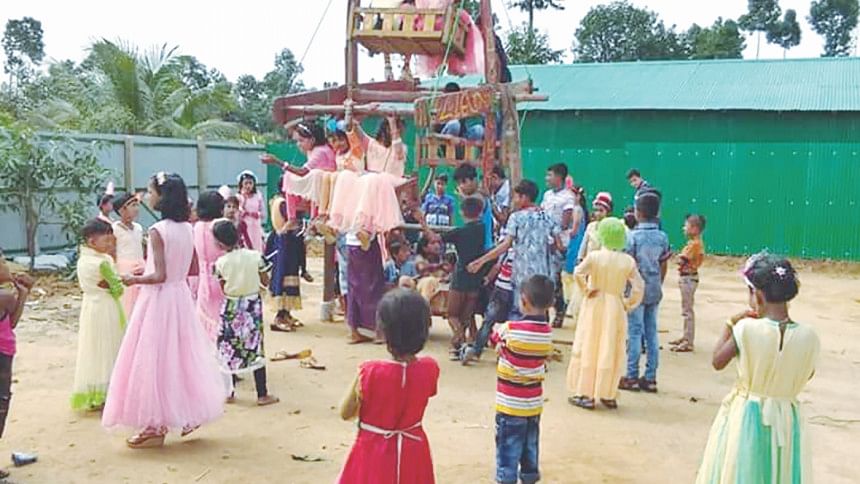First Eid away from home

An estimated seven lakh Rohingya refugees celebrated their first-ever Eid in squalid, crammed camps on foreign land. It was a bittersweet celebration, tinged with the feelings of both grief and relief, and the fresh memories of losing loved ones back in Myanmar.
“This is the first Eid we have celebrated without family, in a foreign land. It was painful and full of sorrow for us,” 80-year-old Junu Begum told The Daily Star at a Nayapara camp in Teknaf.
The festival came in the middle of monsoon season, which, the refugees, local administration and aid agencies fear, could trigger landslides and flash floods.
Mosques in the vast Kutupalong camp in Cox's Bazar were full on Saturday morning as refugees performed the Eid prayers, praying for safety during the rainy season. They then exchanged embraces, reports AFP.
Dil Mohammad, living in the same camp, had fled to Bangladesh to escape the military crackdown in Myanmar last year.
He believed refugees didn't have anything to celebrate. “When we are struggling to get two meals a day, Eid celebrations are a luxury.”
A Rohingya community leader in Balukhali, Mohammad Lalu, however, was happy to be able to offer Eid prayers together with other Rohingya refugees.
Ziaul Haq, another Rohingya refugee, living at Leda Camp of Teknaf, told an Anadolu Agency, Ankara-based international news agency, that they are happy here.
“At least we are safe now from a murderous situation. [But] How we live now is not a life at all. We want to go back to our own country, but we need citizenship rights and safety there. When we get justice and return to our own country, then we will celebrate Eid properly,” he said.
For 27-year-old Humaera Begum, Eid this year was devoid of happiness as her husband remained a prisoner in a Myanmar jail.
She said she didn't even know if her husband was still alive.
While the elders mourned the loss of their loved ones, their relatives and homes in Myanmar, the children were happy with small gifts distributed by different agencies ahead of Eid, even though many had said that the gifts weren't adequate.
On Eid day, children in Kutupalang roamed the camp adorned in new clothes and enjoyed riding the ferris wheel, reports AFP.
Community leader Mohammad Mohibullah said they wanted the UN to "include a Rohingya representative in the repatriation agreement procedure.”
"I sold some rations in the local market to buy my children new clothes. They are very happy," Manu Mia, another refugee, said on Saturday.
Many homes in the camps had the elderly preparing different desserts for the occassion.
Eighty-year-old Gul Meher made vermicelli called “shemai” for her son and four grandchildren.
"Though we managed to cook very little and only for my grandkids, I feel very happy," she told AFP.
About 700,000 Rohingya refugees have arrived in Bangladesh since the crackdown that began on August 2017, that the UN and the US say amounted to "ethnic cleansing". They joined those who had fled earlier violence in mainly Buddhist Myanmar.

 For all latest news, follow The Daily Star's Google News channel.
For all latest news, follow The Daily Star's Google News channel. 



Comments